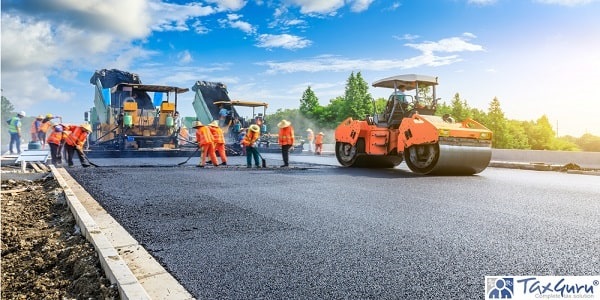The infrastructure sector is considered to be key driver for the Indian economy. The sector is highly responsible for propelling India’s overall development and enjoys intense focus from Government for initiating policies that would ensure time-bound creation of world class infrastructure in the country. Infrastructure sector includes power, bridges, dams, roads, and urban infrastructure. Recently in the union budget 2021, an amount of INR 233,083 Crores was allocated for the enhancement and development of transport infrastructure. This sector is also one of the major sources of FDI investment as in FY 21 as 13% of total FDI inflows was in the infrastructure activities in India.

Development of roads have been primary responsibility of the Government of India. For the purpose of achieving the same, there is a decent share of private players in this sector through Public-Private partnership (‘PPP’) model. The PPP model has proved to be the most efficient and effective way of developing infrastructure specially the roads. There are several models under which the Government and the private players enter into an agreement for the execution of the infrastructure EPC contracts. Some of the major models along with their tax implications are discussed below:
Engineering, Procurement and Construction (‘EPC’) model
Under this model, the land rights vest with the Government. The same is not transferred to the private player. The primary role of the Government is to finance the project and where the whole project is financed by the Government, the toll collection rights vest with the Government.
The role of the private player under this model is to supply services for the construction of the roads. The Government would be liable to pay the consideration for the services provided by the private player.
Taxability of EPC model
The construction services provided by the private sector to the Government would qualify as “Works Contract” services. Further, such services would be taxable at the rate of 12% as per entry number 2(iv) of the Notification No. 11/2017 – Central Tax (Rate) dated 28 June 2017
Since the outward services supplied by the private player qualify to be “works contract services”, it would be eligible for full input tax credit and in case it is receiving the inward works contract service, the restriction of input tax credit under clause (c) Section 17(5) of the CGST Act, 2017 will not apply.
Further, as per entry number 2(ix) of the above-mentioned notification, road construction services provided in the capacity of sub-contractor to the main contractor would also attract lower GST rate of 12%.
Build – Operate – Transfer (BOT) model
Over the past 18 years, several road projects have been executed through the PPP mode under the Built-Operate-Transfer (BOT) model. The land rights and ownership vests with the Government in this model as well. The role of the private player under this model is to finance the project as well as undertake the construction of the roads. Since the project is financed by the private player, a revenue collection right is granted in the form of toll collection for recovering his investment. The Government’s role, under this model, is limited to revenue sharing from the toll collected by the private player.
Taxability of BOT model
The Private sector does not provide works contract services to the Government under this model. Ultimately, the private player would be collecting toll charges in lieu of the access to the road. Such service provided by the private player by way of access to a road or a bridge on payment of toll charges is exempt from GST as per serial number 23 of the Notification No. 12/2017 – GST (Rate) dated 28 June 2017
As the outward supplies made by the private player is exempted from GST, input tax credit on the inward supply of goods and services would not be available eventually leading to increase in cost of project
BOT Annuity model and BOT – Hybrid annuity model
Under this model, the land ownership and rights remain with the Government. The private player’s role under this model to finance the project and unlike receiving the toll collection rights in the earlier model, receiving payment in annuity from the Government. The toll charges collection under this model vests with the Government. Further, the Government is also responsible for making the annuity payment to the private player. Eventually the entire project cost is recovered by the private player in form of annuity payments received from the Government.
The BOT-hybrid annuity model is a combination of EPC and annuity model. The consideration under this model is paid to the private player in the following manner:
Certain percentage of total cost of project is received in construction phase either in lumpsum basis or mile stone basis
Remaining payment is made in the form of annuity post completion of construction for agreed number of years
Taxability of BOT-annuity and BOT hybrid annuity model
Though a clear exemption from GST has to be provided in case of service provided by way of access to a road or a bridge on payment of toll charges, there is no clarity whether such exemption will hold good in case of annuity payments received by the private player or not.
A negative ruling has also been given by the Advance Ruling Authority, Rajasthan in the case of M/s Nagaur Mukundgarh Highways Private Limited wherein the authority held that annuity payments received by the applicant is for the road construction services and therefore liable to tax.
After several representations made by the construction industry in this regard Serial No. 23A has been inserted by Notification No. 32/2017- Central Tax (Rate) dated 13.10.2017 in Notification No. 12/2017 – GST (Rate) dated 28 June 2017 to exempt “service by way of access to a road or a bridge on payment of annuity”. However, such exemption has been provided to the services provided under HSN 9967 i.e., support services in relation to transport and not to the road construction services classified under HSN 9954.
Further, enhancing the complexities in this issue, the Government issued a Circular No. 150/06/2021 – GST dated 17 June 2021 clarifying that exemption provided under the Serial Number 23A is applicable only in case of services classified under HSN 9967 and not under HSN 9954.
On account of such clarifications, it appears that annuity payment received towards road construction is subject to GST and the aforesaid exemptions does not apply.
Considering the huge potential of this sector, it is important that industry should represent before the Government requesting for clear view of the taxability of the annuity payments under GST laws.





